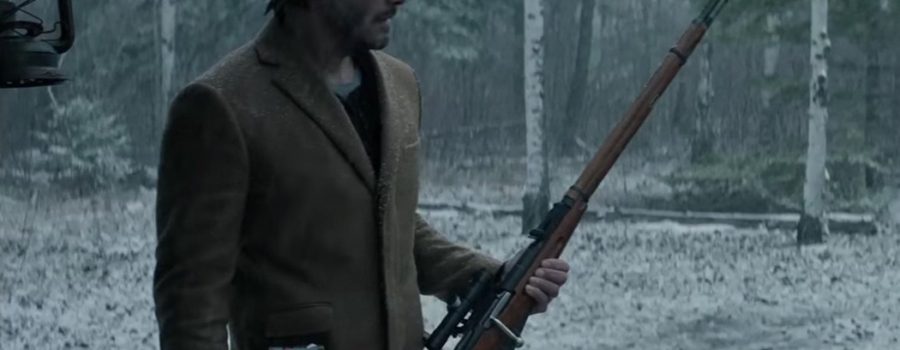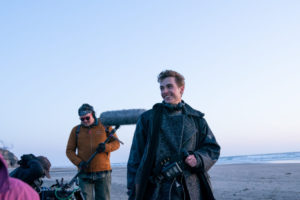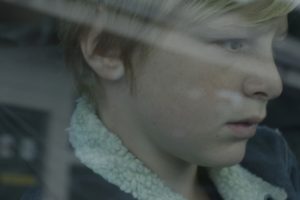[Published at Film Inquiry] Matthew Ross spent the first 38 years of his life believing he was a filmmaker. He was correct in believing so. The journalist-turned-writer-director burst onto the scene in 2016 with the psycho-sexual thriller Frank & Lola. The Michael Shannon and Imogen Poots vehicle was a project eight years in the making. Ultimately, it was a critical success. Ross‘s film also caught the eye of one extremely famous actor who ultimately approached him with a script he had developed. That actor’s name was Keanu Reeves, and the script, Siberia, would be Ross‘s next feature film. Though considerably larger in scope and scale than Frank & Lola, Siberia is not your typical Reevesaction film. Rather, its a crime and romance thriller containing many of the same themes as Ross‘s first feature.
In Siberia, Reeves plays an American diamond trader who participates in a deal-gone-wrong, and is sucked into a black hole of crime and deceit. During the process, he begins an intense love affair with a Russian café owner (Ana Ularu). Love, betrayal, sacrifice, deceit, crime, and action are abound in Siberia.
Recently, I caught up with Ross to discuss his brief but prolific filmmaking career, working with Reeves in Siberia, recurring themes he likes to explore, and much more!

source: Saban Films
Alex Arabian for Film Inquiry: Congratulations on your sophomoric feature, Siberia.
Matthew Ross: Thank you very much.
What initially drew you to the script?
Matthew Ross: Well, this is a unique experience for me. Of course, most experiences are going to be unique when you’ve only done this once before. But, my first film took me eight years to get made, and I’d written the draft, and had worked on it and the script sort of regularly throughout the time it took to get made. So, by the time we got into production, it was something that was sort of fully baked into my creative DNA. And this was something that came to me through Keanu, who had seen Frank & Lola and really responded to it, which was a very wonderful and humbling thing to learn about. And then, I read the script with him in mind, obviously, because he had developed it.
And the thought of not just making this story, but making this story with Keanu as an actor, and exploring territory that audiences hadn’t really seen a lot of, in terms of him as a performer recently, was a very intriguing idea for me, to do something that was more vulnerable, more intimate, more personal than we’re used to because he’s such an intelligent, sensitive performer. And, I think, often, his tremendous physical abilities as an actor, and his ability to command, these huge movies, is undeniable, but I think sometimes people might forget about what he’s capable of in more intimate circumstances. So, the idea of doing that with him was very appealing to me.
I really enjoyed both Frank & Lola and Siberia.
Matthew Ross: Oh, thank you.
Of course. Love and betrayal are recurring themes throughout both of them. What is it about these themes that brings out the best in you?
Matthew Ross: Well, I think love and trust are two tremendously powerful themes, and I think themes or emotions that are so crucial to everyone’s lives, and can really affect people in very unexpected ways. So, to explore how love, or lack of love, or trust, or lack of trust can affect characters is something that I’ve always been intrigued by as a storyteller. And I think they also make for a very cinematic experience if done the right way. So, I’m sure Keanu saw some similarities in the different themes of Frank & Lola to what they developed with Siberia, which was one of the reasons that he had approached me with the script. But I was very happy to continue to explore them under different circumstances with different characters. I just think they’re very potent topics that will never get exhausted, really. They never get old, and they’re always there. And everybody feels them. So why not continue to explore them?
I understand Keanu shot his scenes in Winnipeg. Some of Siberia was shot in Canada, some of it in Russia. Can you elaborate on the process for location scouting for this film?
Matthew Ross: Well, there’s really three main parts. There’s the Siberia stuff, which we shot all in the province of Manitoba, outside of Winnipeg; Siberia and rural Manitoba share a lot of similarities in terms of landscape and climate and architecture. And that process, while quite intense in terms of battling the elements when you were scouting, was pretty straightforward.
Obviously, the big challenge was to make sure that the culture and the art direction, the costumes, the props, were all perfectly Russian and authentic. And we had a lot of help in our Russian quality control in terms of vetting everything. Shooting the interior of St. Petersburg in Winnipeg was a different kind of challenge, and one that required a lot of ingenuity on everyone’s part because you couldn’t really imagine two cities that are more different, visually, than Winnipeg and St. Petersburg.

source: Saban Films
We recreated all those hotel rooms inside vacant ballrooms in a Winnipeg hotel. So, everything is sort of made from scratch in there. And the most important thing was to have it really feel like you were in this opulent, and very Russian, grand atmosphere so that when we went to Russia and shot the exteriors in St. Petersburg there, that they would blend in seamlessly in the edit. You know, it’s funny. You shoot a movie and you see Keanu exit a car and walk into a building. And you shoot that scene in St. Petersburg, and as soon as you walk into the building, you pick him up, and you’re inside a Winnipeg hotel.
And the trick is to – the challenge is to – make that feel seamless because nobody’s going to know that. Nobody should know that. And it’s your job as filmmakers to keep that illusion very much alive. So, it was a lot of work. We had an incredible visual team, specifically, our production designer, Jean-André Carrière, and my partner in crime, Eric Koretz as my DP, who I’ve worked with on both of my films and who’s just like a creative brother to me. So, without those guys, there’s no way we would’ve been able to pull this off. It was a real challenge.
This film is larger in scale than Frank & Lola. Did you feel added pressure working with a deeper budget, or was it more liberating as a director?
Matthew Ross: Oh, that’s an interesting question. Let me think about that for a second. Certainly, there’s more pressure when you’re making a second film, and you’re making it with one of the biggest movie stars in the world. There’s gonna be a lot more eyeballs on you, your story isn’t gonna be this filmmaker who spent eight years trying to get Frank & Lola made and finally got it made. It’s now, you’re a professional director making a movie with a huge movie star, and you better not mess it up [laughter]. So, it’s a different kind of pressure, I would say, than it was making Frank & Lola.
The pressure of making Frank & Lola was like, “Okay. I’ve spent – ” I was 38 when we went into production on that film – I’d spent the first 38 years of my life believing that this is something I was meant to do, and that I’m going to be really good at, and let’s now see if I was completely off-base or not [laughter] because now I actually have the opportunity to do it. You know? And then, with this movie, it was, “Okay, the stakes have raised everywhere. They’re raised everywhere,” and you just need to embrace the pressure, really. And then, embrace it and work with it, and almost enjoy it in a strange way, because there’s no avoiding it. So, my approach is to really just embrace it head on and attack it.
You were a story consultant on Curb Your Enthusiasm.
Matthew Ross: Yeah.
“Palestinian Chicken” is one of my all time favorite episodes.
Matthew Ross: Oh, cool.
Clearly, you have an aptitude for comedy. Do you see a comedy sometime on the horizon for you as a filmmaker?
Matthew Ross: I would love to make a comedy. Absolutely. I certainly don’t want to be pigeonholed as a filmmaker, ever. And my favorite filmmakers have all been filmmakers who have dipped their feet in a number of different genres. Whether it’s Kubrick doing Lolita, or Altman doing Nashville, which, while it’s many things, it’s also very much a comedy. I would love to make a comedy at some point. For sure. It’d be fun. A new challenge.

source: Saban
Awesome. That’s a great transition to my next question. You mentioned a few, but what are some of your other artistic influences as a filmmaker?
Matthew Ross: Yeah. I have a ton of cinematic heroes that I’ve relied on very intensely as I’ve been able to start my own career as a director. I can give you a few of them, but I certainly won’t be naming all of them. But Kubrick, Hitchcock, Polanski, Claire Denis, Michael Mann, Tarkovsky, Kurosawa. I mean, a lot of those are members of the unquestioned pantheon. All of them are well-known, but others I don’t feel like are, sometimes, given the credit they deserve for being such visionaries, especially Claire Denis, who I just think is a genius.
Likewise. You’ve had a successful career as a journalist and a filmmaker. How did you finally make that leap from journalism to film?
Matthew Ross: Well, it took me eight years to get Frank & Lola made. And by eight years, I mean eight years of always having reputable, solid producers on board, and one or both of the leads, and some or all of the money, and it just being an inch away, constantly, for eight years. Until finally, it all fell into place, and we got lucky. But I think, obviously, we wouldn’t have gotten lucky had I not just stuck around and insisted on not giving up on this movie. Because there were certainly many times on Frank & Lola where I could’ve walked away, and probably walked away justifiably, but I just knew that this is a film that I had to begin my career with, and a story that I needed to tell, and a story that I felt would really allow me to show who I was as a filmmaker with his own voice. So, I would say stick-to-itiveness was my secret. Just a relentless, sometimes delusional optimism that things would work out [laughter].
Are there any exciting projects that you’re currently working on now that Siberia has finished?
Matthew Ross: Yeah. I’m working on a few things in both film and television, at the moment, none of which I’m probably allowed to discuss publicly yet, but I hopefully will be soon. But, rest assured, I’m not taking any time off, and I am looking for my next project that I can get back behind the camera on as soon as possible. I love directing movies and I just want to do it again.
Film Inquiry thanks Matthew Ross for taking the time to speak with us.
Siberia will be released theatrically and on VOD in the U.S. on July 13, 2018. For more information on its release including international release dates, click here.
Opinions expressed in our articles are those of the authors and not of the Film Inquiry magazine.








Leave a Reply
Your email is safe with us.